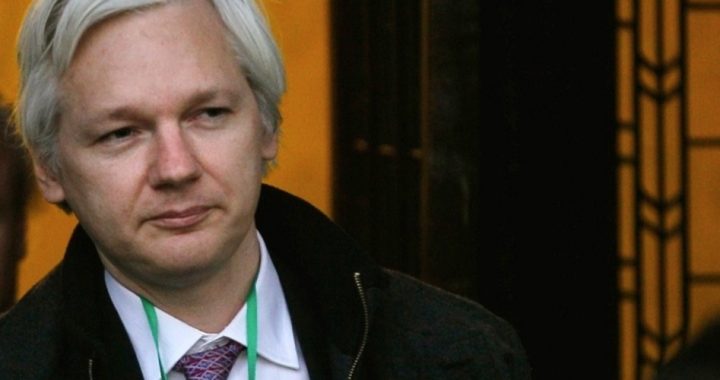
Following a high-profile legal battle that raged on for more than a year and a half, the British Supreme Court ruled Wednesday that WikiLeaks founder Julian Assange could be extradited to Sweden, where he is wanted for questioning in a bizarre sex-crime investigation that his supporters say is politically motivated. However, the high court also gave the pro-transparency activist’s lawyers two weeks to contest the ruling. And he still has other options left, too, such as appealing to the so-called “European Court of Human Rights.”
While much of the media coverage has focused on the legal wrangling over extradition from the United Kingdom to Sweden, an even more serious concern, according to WikiLeaks enthusiasts, is whether the Swedish government intends to hand him over to U.S. authorities. Assange believes that U.S. prosecutors may have a sealed indictment potentially charging him conspiracy or even espionage for his role in publicizing classified government information — some of which exposed war crimes, corruption, deception, conspiracies, and criminality at the highest levels.
Suspicions about possible secret charges have not been officially confirmed. But e-mails released by WikiLeaks earlier this year from the private intelligence firm Stratfor indicated that a sealed indictment did indeed exist. Documents obtained by media organizations also confirmed that WikiLeaks was the target of an “unprecedented” criminal investigation in the United States, and that reports of a secret grand jury being convened in Virginia were probably accurate. Embassy cables from late 2010 revealed that the U.S. Justice Department was investigating whether it could charge Assange under the Espionage Act, too.
Meanwhile, the Obama administration is in the midst of a high-profile but extremely controversial prosecution of Pvt. Bradley Manning, the man accused by U.S. officials of allegedly leaking the secret documents to WikiLeaks in the first place. His supporters argue that he is a whistleblower and should be afforded official protection under the law for exposing criminal activity within governments around the world. Military prosecutors, however, charged him with “aiding the enemy.” If convicted, Manning could face life in prison.
Australian Attorney General Nicola Roxon and Foreign Minister Bob Carr both claimed recently that their government had no information about whether or not the Obama administration actually planned to prosecute Assange, a citizen of Australia. If the U.S. government did seek an extradition, though, Australian authorities would offer a “high level” of consular support. However, the government would not get involved in any potential extradition process, officials said.
“Australia would not expect to be a party to any extradition discussions that may take place between the United States and the United Kingdom or the United States and Sweden, as extradition is a matter of bi-lateral law enforcement cooperation,” Roxon was quoted as saying in the Australian press. Still, consular representatives would work to ensure that Assange “be afforded due process if any action were to be taken,” she said. And the WikiLeaks chief could also apply for an international transfer to an Australian prison if he were to be convicted by a U.S. court.
One of the key points in the U.K. extradition case was whether a Swedish prosecutor could be considered a “judicial authority” able to issue European arrest warrants. In the UK, an impartial judge must sign a warrant. The one for Assange, however, was signed by a Swedish prosecutor, who would presumably be biased against the accused. The British Supreme Court rejected the argument and ruled against Assange in a 5 to 2 decision.
Speaking for the majority, Supreme Court President Nicholas Phillips admitted that the case had “not been simple to resolve,” according to the Associated Press. However, the court eventually decided that “the request for Mr. Assange’s extradition has been lawfully made and his appeal against extradition is accordingly dismissed.” The ruling gives Assange and his team two weeks to decide whether or not to appeal.
One of Assange’s Swedish lawyers, Per Samuelson, told Reuters that the defense team was still deciding whether or not to contest the court’s decision. But even if the WikiLeaks chief does eventually end up in Sweden, Samuelson believes his client will be cleared of wrongdoing. “I feel a strong conviction that he will, in Sweden, in due time, one way or another, be vindicated — he will be exculpated and acquitted,” the attorney was quoted as saying. “I look forward to this with confidence.”
Another lawyer for Assange, U.K.-based Solicitor Gareth Peirce, vowed to fight Wednesday’s ruling. “We are going to ask the Supreme Court to reconsider,” Peirce said after the hearing. Analysts also suggested that the decision could be appealed to the European Court of Human Rights to further delay the potential extradition. If the defense pursues that route, the European tribunal would have two weeks to decide whether or not to take the case. If it refused, Assange would be promptly shipped to Sweden for the investigation.
“This process has been dragging on for very long,” complained Karin Rosander, a spokeswoman for the Swedish prosecutor’s office. “Due process requires that this case is handled efficiently from now on.” Assange is currently out on bail and under house arrest in Britain, but could theoretically be transferred to authorities in Sweden in the coming weeks. And his supporters worry that he could spend months in solitary confinement waiting to be questioned there. So far, however, the notorious anti-secrecy activist has not been charged with a crime.
Outside the court in London, crowds of WikiLeaks supporters gathered to shout slogans like “Free Assange! Free Manning!” and “Exposing war crimes is not a crime.” Despite extraordinary difficulties confronting the operation — financial service providers severed their ties with WikiLeaks under government pressure, for example, making it tough to accept donations — WikiLeaks has continued to release documents and make headlines.
Assange has also recently hosted several episodes of a TV show on RT, a worldwide Kremlin-funded media channel. He interviewed several high-profile guests including the head of Hezbollah and the President of Ecuador. In March, the WikiLeaks chief made headlines when he announced his intention to run for a seat in the Australian Senate — while under house arrest. WikiLeaks, meanwhile, has been busy as well.
The organization first surged to prominence in 2010 after releasing video footage of U.S. troops firing on civilians and journalists — including people trying to evacuate the wounded, an act that is considered a war crime. The group later released hundreds of thousands of U.S. embassy cables exposing a broad array of damaging information on governments. More recently, WikiLeaks began a project aimed at exposing what it dubbed the “mass surveillance industry.” And this year, it began releasing a trove of e-mails taken from the U.S.-based intelligence firm Stratfor by hackers.
In the wake of some of the leaks, embarrassed governments worldwide recoiled in horror. Outraged U.S. officials and commentators called for everything from censorship to a prosecution for treason and even the extra-judicial assassination of Assange as an “enemy combatant.” Today, his fate and the fate of the organization he founded are up in the air. And without a doubt, government officials all around the world with secrets to hide are smiling wide.
Related articles:
The WikiLeaks Disclosures in Perspective
WikiLeaks: Whistleblowing or Treason?
WikiLeaks’ Assange Out on Bail, Fears U.S. Espionage Charges
WikiLeaks Leads to Calls for New Infringements on Speech, Press
Army Private Accused in WikiLeaks Case Charged with Aiding the Enemy
WikiLeaks Confirms North American Integration Scheme
WikiLeaks Climate Revelations Spark Fury, Gloating
WikiLeaks’ Assange Accuses Some Critics of Terror, Calls for Prosecution
The Feminocracy: Phony Rape Claims Against Julian Assange
WikiLeaks Starts Massive E-mail Dump From Intelligence Firm Stratfor
WikiLeaks Exposing “Mass Surveillance Industry”
WikiLeaks Chief Assange to Run for Australian Senate
WikiLeaks: Foster Care Children in Ireland Used as Sex Slaves
Photo: Julian Assange, WikiLeaks founder, leaves the Supreme Court in London, in a Feb. 1, 2012 file photo.: AP Images



